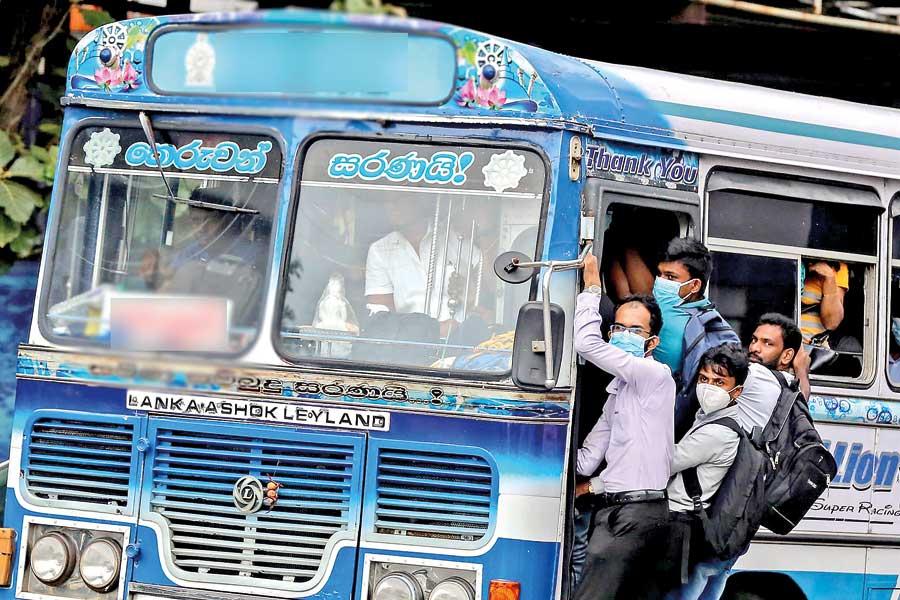Reply To:
Name - Reply Comment
Expert says Sri Lanka’s bus service needs urgent modernisation to provide better service
Commuters should be able to see on their phones what time they need to arrive, what time they will reach their destination and even how crowded the bus is

Sri Lanka’s public transportation, particularly its bus service, requires modernisation and reformation. Particularly in places like Colombo.
places like Colombo.
“In Colombo, at least 65 per cent of commuters should ideally use public transport based on the city’s population density,” Prof. Amal Kumarage, told the Daily Mirror.
Prof. Kumarage is a Senior Professor in the Department of Transport and Logistics Management at the University of Moratuwa and is an expert in public transport.
“The higher the population density and urban flight are, the higher the percentage of people that need to be hauled by public transport,” he said.
“What we need now is to bring in technology. If you look at the recent development in transport globally, it has always been technology-driven, for example, mobile apps, online payments, methods to improve reliability,” Prof. Kumarage said.
According to Prof. Kumarage, buses must have a reliable timetable, and online or card payment options.
“Commuters should be able to see on their phones what time they need to arrive, what time they will reach their destination and even how crowded the bus is. The technology for all of this is available in Sri Lanka, it just needs to be packaged together by the relevant agencies and delivered to the public,” he said.
The end of the semi-luxury bus service
“We have made the move to get rid of all the semi-luxury buses and convert them into a normal route service or an air-conditioned service at no additional cost. We won’t be cancelling the permits. We have informed most of the semi-luxury bus owners and sent them letters asking them to move into one of those sectors,” said NTC Chairman Shashi Welgama.
According to Welgama, the process of converting semi-luxury buses into normal routes or air-conditioned buses is already underway and will be completed very soon.
This conversion also means that more affordable buses will be made available to the public since semi-luxury buses charge a higher fare.
Semi-luxury buses: A history
The objective of the semi-luxury bus service was to provide comfortable travel with only seated passengers and stops only at approved bus stands. Semi-luxury buses charge 1.5 times the regular bus fare.
Since the inception of the semi-luxury bus service, there have been complaints of sub-standard conditions with no real difference to normal buses, but at a higher price.
In addition to this, there have been many public complaints of these buses stopping at points which are not approved bus stands with the number of passengers exceeding seating capacity.
An audit by the National Audit Office’s Performance Audit Division on the long-distance semi-luxury bus service (Report No: PER/SLB/2017/01) documents that during the first four months of 2017, 47 per cent of public complaints received by the National Transport Commission had been about the semi-luxury bus service.
In January 2023, semi-luxury buses operating the Kataragama-Colombo bus route were cancelled, resulting in the reduction of the bus fare from Rs. 1,541/- to Rs. 1,117/-.
How is the NTC planning to meet the needs of modern commuters?
Public bus users need to be provided with affordable, comfortable transportation. The bare minimum that is expected in modern-day has evolved beyond past expectations.
According to NTC Chairman Shashi Welgama, there are ongoing discussions on ways to add value to the bus service.
For example, the NTC is considering providing Wi-Fi facilities and introducing GPS, cameras and fans into the bus service.
Introducing cashless payment methods to public transport has been a longstanding discussion. Mr Welgama stated that preliminary studies and pilot projects involving electronic ticketing are being carried out in the Kottawa-Galle bus route.
This week, Transport Minister Bandula Gunawardena announced that the Sri Lanka Transport Board will soon be introducing cashless ticketing to its fleet, in a move to cut the continuous losses incurred by the State transport authority. The Minister also highlighted the need to make SLTB self-sufficient by the year 2025, in order to avoid the possibility of privatising the state entity.